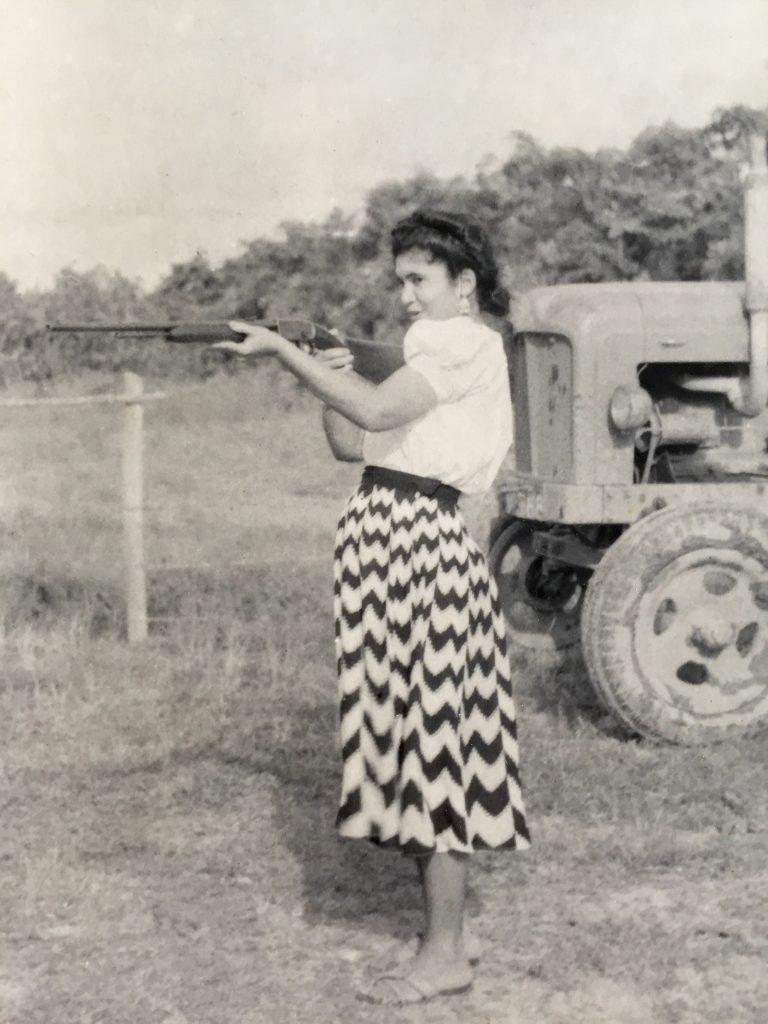A grandson to a grandmother with dementia: ‘I want you to know, I am here with you’
J.P. Larocque: “Your love was a tether that kept me to this world. Now, as you sit beside me with vacant eyes, I long to be that tether to you.”

JP Larocque’s grandmother, Celene (Courtesy of JP Larocque)
Share
A needle piercing the cotton fabric of a dress. Your swimsuit-clad body lying in the sun as waves cascade over a stone seawall. Callused hands clapping the warm, flaking dough of a roti.
These images are memories passed down through your stories. They are as woven together as we are now, quietly sitting on the back stoop of my mother’s Toronto home.
There are moments you are here, your eyes full of recognition as we look at an old photograph. In it, you’re in an open field, a sundress clinging to your pregnant body. A rifle rests on your shoulder, cocked and ready. A glimpse of your strength.
You recount the sugarcane fields our ancestors harvested, the parties of Guyanese high society, and the snowy nights in suburban Etobicoke, caring for me, your runt of a grandson. These disparate memories are spread across thousands of miles and different lifetimes. They’re a common experience for immigrants; the only bags one carries across borders.
BEFORE YOU GO: Dear Mike Sloan: ‘You were a teacher offering a great gift’
Then you are gone, your eyes blank and confused.
Some have likened dementia to being unmoored in time. In these moments, I hope you find yourself in a safe version of the past, far away from the rioting and fear that drove you from your homeland in 1973, and unaware of the disease currently ravaging your mind. I want you to know, I am here with you.
The immigrant narrative is often one of hardship and sacrifice; fantasies are reserved for those higher up the chain. But to you, imagination has always been a liberating force; a place to challenge harsh realities and create your own stories. It was through you that I first fell in love with the power of storytelling—its ability to inspire and forge empathy. You always nurtured that passion, encouraging me to write, draw and perform.
You loved the arts. You preferred elaborate outfits, you read me your favourite novels and pulled me close while we watched old Hollywood movies. Each reminded you of the magic of your old life: your husband, a famous musician, and your children, whose brown bodies were wrapped in golden fabric as they swayed on stage for various dignitaries—the Indian sitar filling the warm air with its distinctive resonance.
READ: For people with dementia, a fight for the right to die
Civil unrest stripped you of these joys, as Molotov cocktails and militias shifted the political climate of the country. The new world replaced performance with practicalities; my grandfather a security guard, and your children scattered across the continent, their sundresses and saris replaced with winter coats and slacks. Still, you taught me that a person could be more than what was expected of them, and your old movies—love stories like Rose Marie or thrillers like Gaslight—filled me with possibility.
When I was four, and plagued by chronic pneumonia, these fantasies became our lifeline. Beyond the thin plastic of my hospital oxygen tent, you snuck dhalpuri past the nurses—a taste of home in an unfamiliar place. You cleaned vomit from my dolls and sewed them elaborate dresses. A “costume change,” you’d joke. You read me adventure stories and fairy tales, and sang the songs from those old movies, melodies blending in with the chirping machines around us.
Your love was a tether that kept me to this world. Now, as you sit beside me with vacant eyes, I long to be that tether to you. You found freedom in your mind, but it is now a prison—a place of unfamiliar borders, where memories merge, collapse and decay. I desperately wish to sing you home.
You awaken, as if from a dream, and look at me. You say a name—not mine—and I correct you. You smile, grasp my face, feel my beard: “You’re a man now,” you whisper. I laugh and tell you I’m still your boy. I’ll always be your boy.
“Do you remember when I used to read to you? All the stories and songs?” you ask.
“I do, Nanny. I remember.”
“Good. Because sometimes, people forget.”
This article appears in print in the April 2020 issue of Maclean’s magazine with the headline, “Dear Nanny…” Subscribe to the monthly print magazine here.